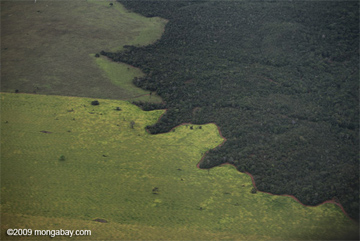 Should China take the full blame for its skyrocketing emissions of carbon dioxide (CO2) and other heat-trapping gases that cause global warming? Or should these emissions be split with the U.S., EU and other countries that are outsourcing their manufacturing -- and their emissions -- to China?
Should China take the full blame for its skyrocketing emissions of carbon dioxide (CO2) and other heat-trapping gases that cause global warming? Or should these emissions be split with the U.S., EU and other countries that are outsourcing their manufacturing -- and their emissions -- to China?The same question can be asked of Brazil, where deforestation accounts for 75% of the country's carbon footprint, and the major causes of deforestation are cattle ranching and soy production to produce products that are exported to Europe, Asia and Africa.
Mongabay.com reports on a new study that explores these questions:
Brazil's high annual deforestation rates are currently supporting a massive agricultural industry that exports most of its product abroad: Brazil is the world's largest exporter of both beef and soybeans. Between 1990 and 2006, exports of beef increased by 500 percent. The soy boom, which began in the 1990s, did not cause as much direct deforestation, but pushed cattle farmers and small-land holders deeper into the forest.
From 1990-2006, EU countries and Asian countries were the primary importers of Brazil's soy, while importers of Brazil's beef came from around the world, including Eastern Europe, the EU, the Middle East, Asia, Africa, and other South American nations. Yet so far none of these nations have had to pay a cent for the environmental damage, including high carbon emissions, caused by the deforestation of the Amazon.
Zaks and his team have proposed a model to change this. According to their study when a product is exported half of the emissions should be the responsibility of the producing country and half of the importing country and its consumers.
"There is no 'right way' to proportion emissions between consumer and producer, but we did not think that assigning the burden of emissions to either Brazil OR the importing country would be logical," explains Zaks. "If emissions are assigned only to the importing country, there is a reduced incentive to decrease deforestation in the exporting country."
He adds that the study "chose to split them 50/50 as more of an illustrative example than a definitive answer."
This is some good lifecycle-type thinking here, and I definitely agree that we can't blame countries like Brazil and China for all the emissions. That said, this type of thinking also shows how important it is that we (1) reduce our beef consumption (or at the very least choose more locally raised, grass fed beef from sustainably managed ranches), and (2) choose local and organic.
Perhaps it also indicates that consuming nations need to contribute conservation funding, in an amount in proportion to their imports from Brazil, to REDD-type forest protection initiatives.
Read more>>
...
No comments:
Post a Comment